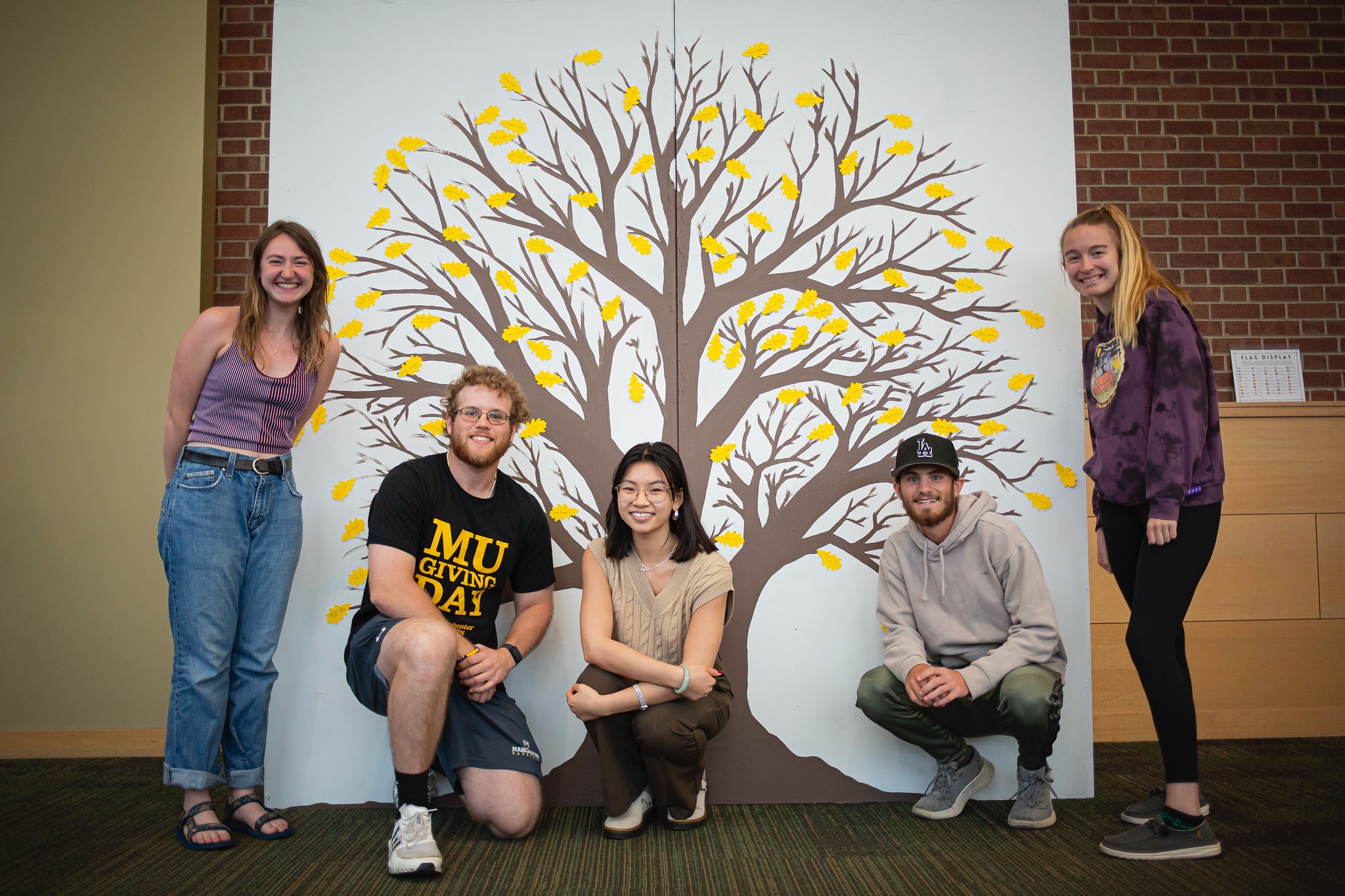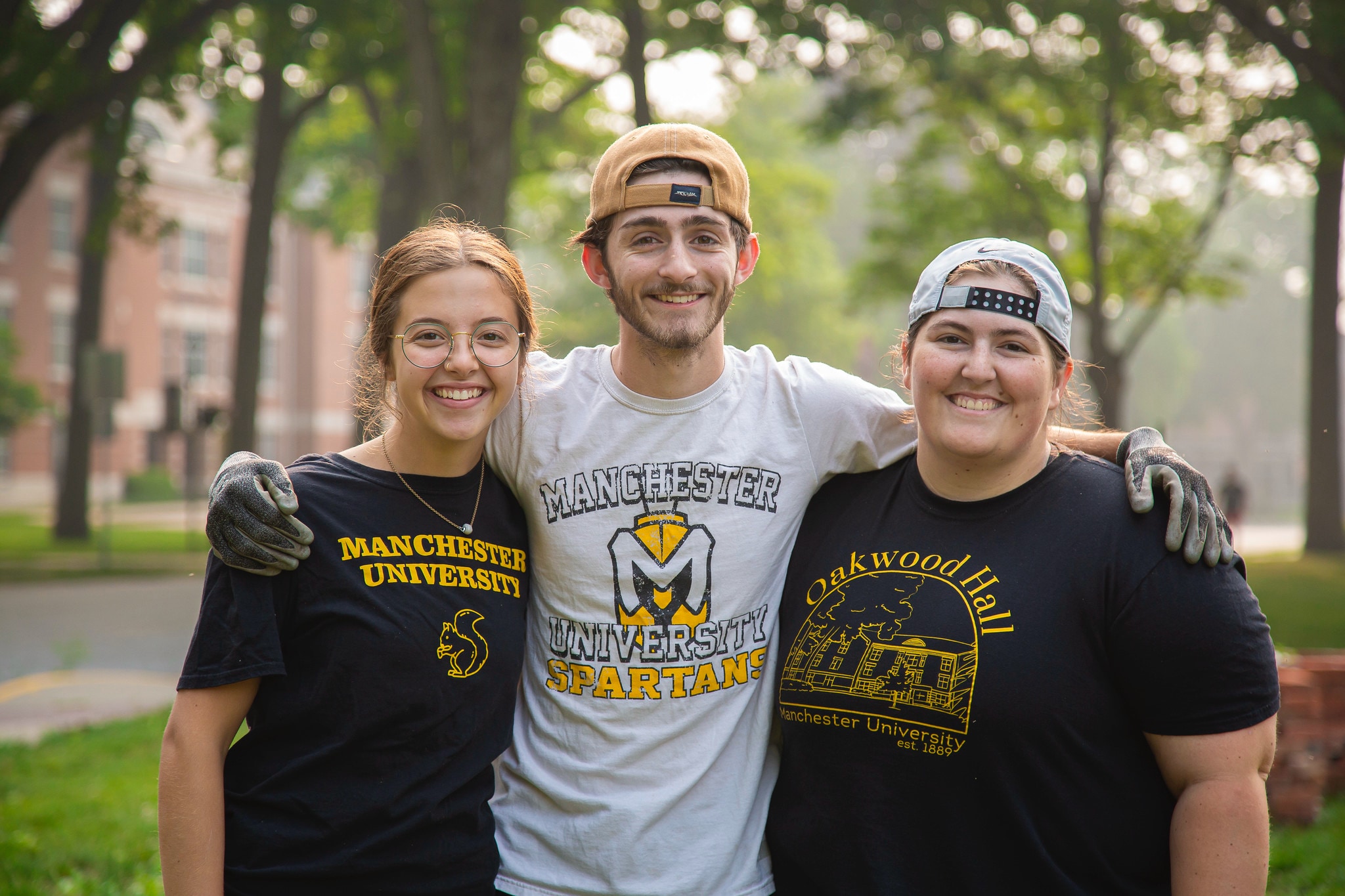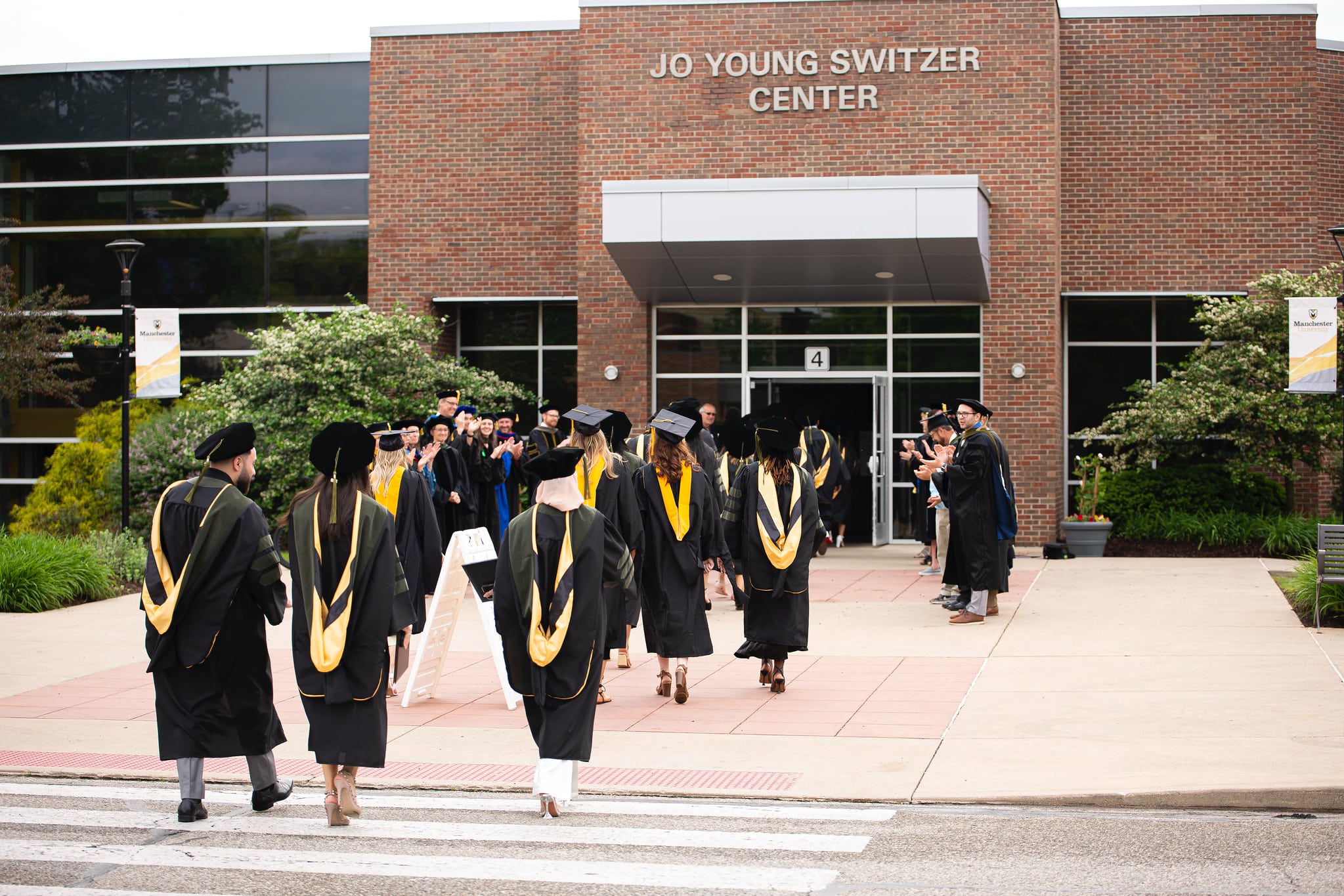Peace Studies
Join the nation’s premier Peace Studies program—founded in 1948—where you’ll explore the roots of conflict, study nonviolent change, and develop skills in mediation and social justice leadership. At Manchester University, Peace Studies is more than a major—it’s a call to build a more just and peaceful world.

Explore Peace Studies at Manchester University: BA, BS, and Minor Options
Manchester University’s Peace Studies program—offering Bachelor of Arts, Bachelor of Science, and minor tracks—invites students to examine the root causes of conflict and explore pathways to justice and nonviolence. As the world’s first undergraduate peace studies program, it blends rigorous academic study with real-world engagement in peacemaking and conflict resolution, preparing students to connect theory with practice. Our mission is to graduate individuals with a critical understanding of the causes and consequences of violence and injustice, equipped with the knowledge and skills to resolve conflict nonviolently and promote justice. Peace studies prepares graduates to be capable, confident, and courageous in the work of building a more peaceful and just world.
Program Information:
Major | BA
- 39 Credit Hours
Major | BS
- 39-40 Credit Hours
Minor
- 18 Credit Hours
Location
- North Manchester

Miriam Erbaugh, Peace Studies, Political Science and Philosophy & Religion

Why Choose MU for Peace Studies?

World’s First Undergrad Peace Studies Program
Hands-On Learning and Global Engagement
Interdisciplinary Curriculum with Practical Impact
Publishing and Research Opportunities
Values-Driven Leadership Development
What You Can Do with Your Peace Studies Degree
Conflict Resolution Specialist
Work in mediation centers, NGOs, or organizational peacebuilding roles
Peace & Social Justice Advocate
Lead campaigns or programs in nonprofits and community organizations
Human Rights Researcher
Analyze issues for think tanks, academic journals, or policy groups
Environmental Justice Coordinator
Support sustainable and equitable programs through CERSE initiatives

Average Starting Salary for Peace Studies Degree Holders
Graduates with a bachelor’s degree in Peace Studies typically earn starting salaries between $50,000 and $60,000, depending on their chosen field and geographic location. Entry-level roles in social services, nonprofit organizations, mediation, and public policy are common pathways. With experience, graduates often move into leadership, advocacy, or international roles, where earnings can exceed $70,000. Manchester University’s Peace Studies program equips students with versatile skills that translate across sectors, including education, government, humanitarian work, and corporate social responsibility.

How the Peace Studies Program Supports Your Growth
Peace Studies Degrees, Requirements, and Courses
Manchester University’s Peace Studies program offers both Bachelor of Arts (BA) and Bachelor of Science (BS) degrees, along with an 18-credit-hour minor. The curriculum is interdisciplinary and rooted in nonviolence, justice, and social change.
Bachelor of Arts (BA) in Peace Studies
39 credit hours
Core Courses (24 credit hours):
- PEAC 110: Introduction to Peace Studies
- PEAC 218: Mediating Conflict
- PEAC 235: Nonviolent Social Change
- PEAC 320: Global Conflict Resolution
- PEAC 330: Analysis of War and Peace
- PHIL 444: Philosophy of Civilization
- REL 205: Religions and War
- INTD 425: Environmental Philosophy
Additional Requirement:
- One course from: SPAN 201, SPAN 202, REL 222, REL 223, REL 325, or REL 435
Plus:
- 12 credit hours of PEAC electives or approved courses
Bachelor of Science (BS) in Peace Studies
39–40 credit hours
Core Courses (same as BA above)
- One course from: DATA 210, PSYC 241, or SOC 324 (in place of a language or religion elective)
- 12 credit hours of PEAC electives or approved courses
Minor in Peace Studies
18 credit hours
- PEAC 110: Introduction to Peace Studies
- 15 elective hours approved by the Peace Studies Council
Sample Elective and Core PEAC Courses Include:
- PEAC 112: Concerning Poverty – Explore global and local poverty issues and responses
- PEAC 120: Current Issues in Peace and Justice – Repeatable course focused on timely social justice topics
- PEAC 250: Peacemaking in Practice Abroad – Travel course examining justice efforts outside the U.S.
- PEAC 275: Practicum in Peace Studies – Off-campus service projects tied to peacebuilding
- PEAC 333: Peace Issues – Ethics and perspectives on militarism, rights, population, and social change
- PEAC 475: Internship in Peace and Conflict Studies – Hands-on experience with justice-focused organizations
Capstone and Assessment
All majors must successfully complete the senior comprehensive evaluation and INTD 425. Additional details are available from the Peace Studies director.
Peace Studies Student Groups and Co-Curricular Engagement
Peace Studies students at Manchester are actively involved in discussion, activism, service, and environmental justice through several student-led groups and initiatives:
Kenapocomoco Peace Coalition
This informal group meets weekly to discuss social, environmental, and political issues of conscience. Meetings often include guest speakers, videos, and planning for on-campus action. Open to all interested students, the coalition fosters critical dialogue and community engagement.
Model UN
Model United Nations (MUN) is an educational simulation where students assume the roles of diplomats representing countries or organizations in United Nations committees. Participants engage in debates on pressing global issues, draft resolutions, and collaborate to find solutions, mirroring the procedures of actual UN conferences.
Center for Environmental Resilience and Social Engagement (CERSE)
A joint initiative of the Peace Studies and Environmental Studies programs, CERSE connects students to education and action on environmental and social justice.
Projects include:
Foodscape development funded by Duke Energy
Partnerships with local food security and justice organizations
Restorative justice efforts with the Miami Nation of Indiana
UN Sustainable Development Goal convocations
Research on native/invasive wasp populations for public health and education
Other Involvement Opportunities
Peace Studies students also participate in:
Internships with justice and advocacy organizations
Practicums tied to nonviolence and peacebuilding
Cross-cultural experiences like the PEAC 250 travel course
These opportunities empower students to apply their values in real-world contexts while building leadership and collaboration skills.
Peace Studies Student Success
Manchester Peace Studies alumni have gone on to careers in policy, education, advocacy, and international service:
- Chris Francois ’20 – Schwarzman Scholar, pursuing Global Affairs in China.
- Amy Weeks ’19 – Working to strengthen local food economies in Michigan.
- Annika Harley ’18 – Policy Associate for Creation Justice Ministries in D.C.
- Katie Jo Briendenchbach-Wooding ’18 – Coordinates recovery housing outreach in Ohio.
- Zander Willoughby ’18 – Communications lead at +Peace in D.C.
- Caitlin O’Quinn ’18 – Serving in Japan through Brethren Volunteer Service.
- Michael Himlie ’17 – Engaged in nonviolent action with Christian Peacemaker Team.
Meet the Faculty
FAQs About Manchester University’s Peace Studies Degree
What is a Peace Studies degree and what makes Manchester’s program unique?
A Peace Studies degree is an interdisciplinary academic program that examines the root causes of violent conflict, structural violence, and cultural violence while exploring nonviolent approaches to building sustainable peace. At Manchester University, peace studies began in 1948 with the establishment of the world’s first undergraduate program of its kind. This pioneering approach to peace education integrates theoretical learning with practical applications in areas such as transitional justice, human rights, and civil society building.
What makes Manchester’s program distinct is its commitment to peace research and experiential learning. Students explore global conflicts through coursework and real-world engagement, equipping them to transform conflict in professional and civic settings. With both Bachelor of Arts and Bachelor of Science degree options, as well as a minor, students develop critical pedagogy skills in ethics, mediation, and social justice.
This peace studies major emphasizes peace and conflict studies alongside the study of direct violence, negative peace, and positive peace. Students graduate with a deeper understanding of how to build peace through civil society engagement, advocacy, and policy. Manchester also supports ongoing peace research and publishes the Bulletin of the Peace Studies Institute. Graduates are prepared to shape a more peaceful world across sectors, from international relations to nonprofit leadership.
What courses will I take as a Peace Studies major?
The Peace Studies curriculum at Manchester University combines academic rigor with applied learning to prepare students to analyze and address violent conflict and injustice. Foundational courses include Introduction to Peace Studies, Mediating Conflict, Nonviolent Social Change, and Global Conflict Resolution. These core classes introduce key concepts in peace and conflict studies, such as positive peace, direct violence, and transitional justice.
Advanced electives expand students’ understanding of peacebuilding and peace education. Examples include Peacemaking in Practice Abroad, which involves international travel and immersion in global conflicts; Concerning Poverty, focusing on structural violence and economic injustice; and Peace Issues, covering the ethics of war and peace movements. All students complete a capstone course and a senior comprehensive evaluation, applying peace research methods to real-world problems.
Manchester’s program also emphasizes experiential learning through community partnerships and off-campus practicums. Students gain hands-on experience engaging with civil society, working on global change initiatives, and exploring the philosophical underpinnings of nonviolence. Coursework draws from the social sciences, arts, and humanities, supporting a well-rounded education that equips students with skills to transform conflict and promote sustainable peace. The interdisciplinary nature of the curriculum ensures students are prepared to pursue careers or graduate programs in peacebuilding, human rights, or international development.
What can I do with a degree in Peace Studies?
A Peace Studies degree from Manchester University opens doors to meaningful and varied career options in both domestic and global contexts. Graduates work in nonprofit organizations, advocacy groups, education, law, public policy, and international development. Positions may include conflict resolution specialist, peace and social justice advocate, human rights researcher, or transitional justice coordinator. Many alumni contribute to peace movements, human rights campaigns, and civil society initiatives that aim to transform conflict and build peace through practical, people-centered approaches.
Because peace studies is rooted in both theory and practice, students are well-prepared for graduate programs in conflict studies, international relations, or law. Manchester alumni have gone on to study at leading institutions such as Columbia University and the Kroc Institute for International Peace Studies at Notre Dame. Others serve in the field through organizations like Christian Peacemaker Teams and +Peace, where they address structural violence and promote peaceful alternatives to armed conflict.
The peace studies major at Manchester emphasizes peace research, peace education, and experiential learning, equipping students with tools to address global conflicts, develop community resilience, and advocate for sustainable peace. Whether working to prevent terrorism, combat inequality, or support reconciliation efforts, graduates play a vital role in shaping a more peaceful world.
What is the difference between the BA and BS in Peace Studies?
At Manchester University, students can pursue either a Bachelor of Arts (BA) or a Bachelor of Science (BS) in Peace Studies. Both degree options share a core curriculum rooted in peace and conflict studies, covering key themes such as violent conflict, nonviolence, civil society, and sustainable peace. However, each path offers distinct academic emphases aligned with student goals.
The BA in Peace Studies integrates courses in philosophy, global languages, and cultural studies, making it a strong fit for students interested in international relations, humanitarian work, or graduate programs in areas like theology, ethics, or diplomacy. This track supports a more humanistic exploration of peace education, examining how structural violence and cultural violence shape global change.
In contrast, the BS in Peace Studies includes more emphasis on research methods and data analysis, with required courses in sociology, psychology, or statistics. This option prepares students for graduate-level peace research, public policy work, or roles that demand data-informed solutions to social issues. Both degrees develop core skills in mediation, conflict resolution, and peace research, and both culminate in a senior capstone project and comprehensive evaluation.
Whether a student chooses the BA or BS, Manchester’s peace studies major equips them to build peace, address global conflicts, and pursue meaningful work in a range of sectors.
Are there experiential learning opportunities in the Peace Studies program?
Yes—Manchester’s Peace Studies program places a strong emphasis on experiential learning, offering students meaningful opportunities to apply classroom knowledge in real-world settings. This hands-on approach supports deeper understanding of peacebuilding concepts like transitional justice, civil society engagement, and the transformation of violent conflict.
Students participate in off-campus practicums, internships with human rights organizations, and immersive travel courses such as Peacemaking in Practice Abroad, where they confront global conflicts firsthand. These experiences deepen students’ understanding of structural violence, cultural violence, and international peacebuilding strategies.
The Center for Environmental Resilience and Social Engagement (CERSE), a cross-campus collaboration, provides additional applied learning opportunities. Projects focus on environmental justice, food security, and sustainable development—all key components of peace and conflict studies in the twenty-first century.
Student groups such as the Kenapocomoco Peace Coalition and Amnesty International offer regular engagement in advocacy and peace movements. These co-curricular activities align with critical pedagogy, encouraging students to become active participants in civil society.
Experiential learning is also central to the program’s capstone and research components, allowing students to engage in peace research and publish findings in the Bulletin of the Peace Studies Institute. This integration of theory and practice is essential to building lasting, positive peace.
Is the Peace Studies program a good option for students planning to attend graduate school?
Absolutely. Manchester University’s Peace Studies program offers a rigorous foundation for graduate study in a variety of disciplines, including conflict studies, law, international relations, theology, social work, and public policy. Students graduate with key competencies in research, peace education, critical thinking, and ethical leadership—skills that are highly valued in competitive graduate programs at institutions like Columbia University or the Kroc Institute.
Because the program is rooted in peace and conflict studies, students gain expertise in analyzing violent conflict, structural violence, and cultural violence. They also learn to design and implement strategies that build peace and foster transitional justice. Through experiential learning, students engage with civil society and global organizations, giving them the applied knowledge necessary for graduate-level research and advocacy.
Manchester’s emphasis on peace research, global conflicts, and sustainable peace prepares students to address urgent twenty-first-century issues, including climate justice, armed conflict, and social inequality. Students are also encouraged to explore concepts like positive peace, negative peace, and conflict transformation in depth.
In recent decades, a growing number of peace studies graduates have entered programs in law, nonprofit leadership, development studies, and human rights. The program’s interdisciplinary nature ensures that graduates are equipped to thrive in any academic or professional setting devoted to building a peaceful world.
Can I combine Peace Studies with another major or minor?
Yes—one of the strengths of Manchester University’s Peace Studies program is its flexibility and compatibility with other academic disciplines. Peace studies is inherently interdisciplinary, integrating fields like political science, environmental studies, sociology, philosophy, and the arts. Students often double major or add minors in related areas, such as religion, international relations, or human rights studies.
This approach reflects the program’s commitment to peace research and its recognition that building peace requires addressing violence and injustice across all sectors of society. Combining Peace Studies with another field helps students develop a deeper understanding of how structural violence, civil society, and peace movements intersect in complex global conflicts.
For example, pairing Peace Studies with environmental studies enables students to engage in projects focused on sustainable peace and environmental justice. A dual focus with sociology or social sciences supports those interested in transitional justice, conflict transformation, and advocacy. Students interested in research careers may also benefit from combining Peace Studies with data analysis or public health.
The program’s design encourages students to engage in experiential learning, cross-cultural exploration, and collaboration with faculty across departments. This academic flexibility enhances career options and better prepares graduates to support peacebuilding efforts in diverse contexts, from nonprofits and NGOs to graduate programs and international diplomacy.
Non-Discrimination in the Admission Process
Manchester University is committed to non-discrimination in campus life. The University does not discriminate on the basis of national origin, ancestry, race, color, age, sex, gender identity or expression, sexual orientation, familial status, religion, disability or veteran status in admissions or any area of campus life, including its educational programs, scholarships and loan awards, residence life programs, athletic programs, extracurricular programs, promotion and tenure policies and practice, and alumni affairs.
Manchester University is committed to carry out the provisions of Section 504 of the Rehabilitation Act of 1973 and the Americans With Disabilities Act, which provide for accessibility of University programs to the physically disabled.








